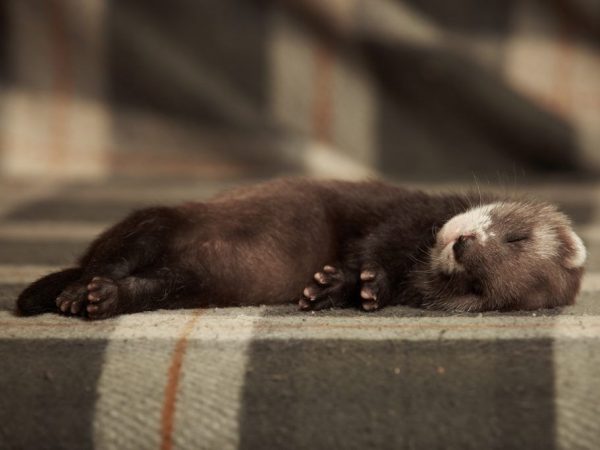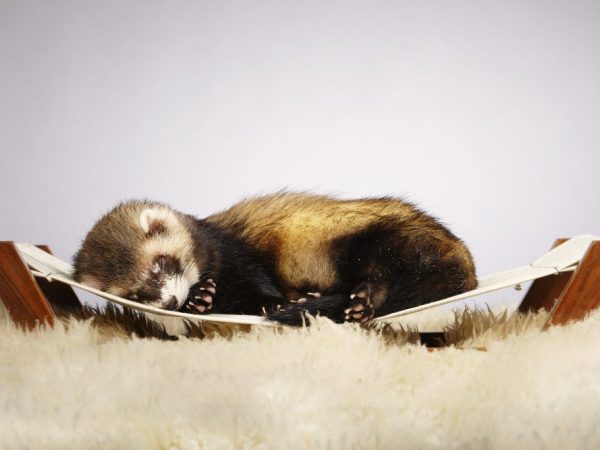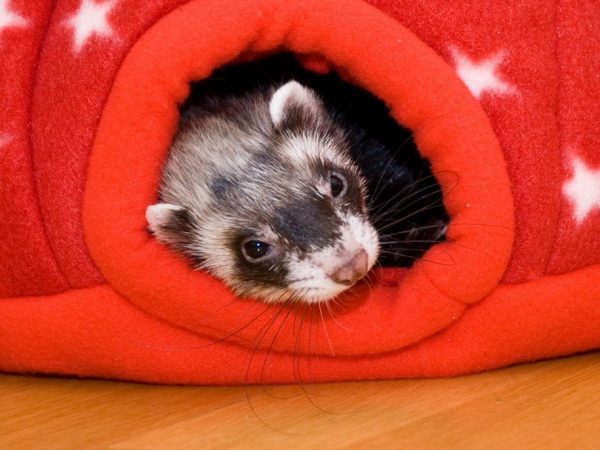When ferrets hibernate
Ferrets, like all domestic animals, have their own structural characteristics. The sleep of these animals is very strong and can last for several hours.

How long do ferrets sleep?
At times, inexperienced owners can be frightened because the sleeping predator does not respond to sounds. But do not be afraid: for these pets, such a phenomenon is considered the norm. How much ferrets sleep is influenced by factors such as seasonality and predator diet.
Sleep features in ferrets
Often, predator owners wonder how much a ferret sleeps a day to be sure of the animal's health. Sometimes the animal can doze for 18 hours a day. The reason why the ferret sleeps for a long time lies in the structure of its body. The animal has a very fast metabolism and an active lifestyle, so it needs a lot of rest to restore energy.
During the day, predators sleep a lot, for a long time and very soundly.
They don't react to anything. They can be picked up, carried from place to place, knocked, clapped and called loudly. It won't wake them up. There is no definite answer yet what exactly happens to the body of ferrets during sleep. It is only clear that these fidgets need such long periods of sleep in the same way as air, food and other basic needs.
Ferrets are nocturnal animals. During the day, the wild animal prefers to sleep, and at night it goes hunting. However, a pet that is kept at home sleeps both during the daytime and in the dark. He can adjust to the owner's schedule, because he loves to communicate and play.
Factors affecting animal sleep
There are several reasons why the animal sleeps too much or too little. Ferrets' sleep is influenced by factors such as:
- season;
- age;
- diet.
Changing seasons can affect how many hours ferrets sleep a day.
Ferrets do not hibernate in winter. But there are seasonal fluctuations in the behavior of these animals. When ferrets hibernate, they can sleep up to 20 hours. This is usually associated with the molting process. This is normal, and you shouldn't worry about lethargy in winter. In the wild, ferrets gain weight for the winter and can sleep in burrows for several days. However, even in natural habitat, these predators go hunting in cold weather.

What affects ferret sleep
The age of the animal also affects the sleep of the animal. A small puppy in the first month of life sleeps less than older individuals. This is due to the metabolism and the amount of vital energy in the body of young animals. Older ferrets can sleep for more than 20 hours. Older predators can sleep all day.
Improper nutrition can cause increased drowsiness of the animal. The diet of the animal must have a lot of calories, otherwise the predator simply will not have the strength for active movements. You also need to remember about the complexes of vitamins and minerals. If vitamin B1 is absent in the body, then this can lead to a violation of the nervous system, which is why ferrets sleep restlessly.
Sleep phases in an animal
There are 2 phases of sleep in these predators:
- The first phase is called slow. During this period, the ferret has a slower heart rate and a lower respiratory rate. There is a process of release of hormones responsible for the restoration of muscle tissue and the formation of leukocytes.
- The second phase is called fast, or paradoxical, because in this phase the ferret is completely relaxed and does not react to what is happening around him. If you give the animal a good sleep, then after the fast phase, the animal has a peak in learning. Everything new remains in memory, thanks to the active growth of neural connections. In this regard, it is better to conduct any training precisely during the period when the ferret woke up and put himself in order.
During wakefulness, the ferret receives an unreasonably large number of impressions due to its activity. To process all the information, fix it, the nervous system needs to grow new interneuronal connections in the brain. This process is so active that all nervous energy switches from external stimuli to internal processes and, as a result, other brain functions are almost turned off, with the exception of the primary ones: breathing, heartbeat, etc.
How sleep affects pet health
A very valuable observation is the deduced pattern between immunity and sleep. If an animal is disturbed to sleep, its production of leukocytes in the blood decreases and its immunity weakens. In this regard, the owner should always remember that the health of the ferret directly depends on the quality of his sleep. You should always pay attention to how much and how ferrets sleep.
Lack of sleep hints at health problems. If in a dream the ferret breathes (albeit slowly), it has a wet pink mouth and a warm body, this is a good deep sleep. If the animal cries or groans in a dream, the body is cold, you should urgently consult a veterinarian.
Ferrets' sleeping place
Hanging the ferret in a hammock is not enough to set up a place to sleep, although it is often sold in a set along with a cage. Hammocks are easy to clean and clean and also easy to attach. The only problem is that ferrets in the wild do not sleep on branches.

Mink for sleeping
These are burrowing animals. It would be best to equip the ferret with something like a burrow at home. To do this, you can use a sleeve from a jacket or other clothing as an entrance to the place that will act as a burrow.
Conclusion
To arrange a nest, a fluffy pet needs soft natural materials. They should not be toxic, even if they get inside the animal, they should either come out naturally or be digested. That is why foam rubber, styrofoam and other similar materials cannot be used.
The ferret sleeps wherever he pleases. This animal does not like loud noises and drafts, so the house for it should be in a quiet place. For the winter, the nest should be insulated, otherwise the predator will not sleep in it.


